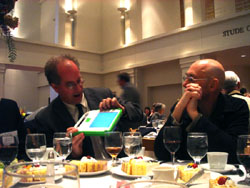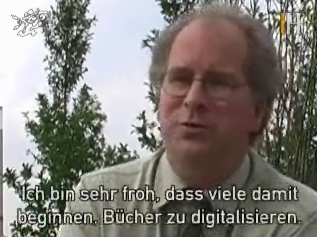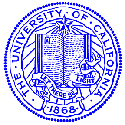For the next few days, Bob and I will be at the De Lange “Emerging Libraries” conference hosted by Rice University in Houston, TX, coming to you live with occasional notes, observations and overheard nuggets of wisdom. Representatives from some of the world’s leading libraries are here: the Library of Congress, the British Library, the new Bibliotheca Alexandrina, as well as the architects of recent digital initiatives like the Internet Archive, arXiv.org and the Public Library of Science. A very exciting gathering indeed.
We’re here, at least in part, with our publisher hat on, thinking quite a lot these days about the convergence of scholarly publishing with digital research infrastructure (i.e. MediaCommons). It was fitting then that the morning kicked off with a presentation by Richard Baraniuk, founder of the open access educational publishing platform Connexions. Connexions, which last year merged with the digitally reborn Rice University Press, is an innovative repository of CC-licensed courses and modules, built on an open volunteer basis by educators and freely available to weave into curricula and custom-designed collections, or to remix and recombine into new forms.
Connexions is designed not only as a first-stop resource but as a foundational layer upon which richer and more focused forms of access can be built. Foremost among those layers of course is Rice University Press, which, apart from using the Connexions publishing framework will still operate like a traditional peer review-driven university press. But other scholarly and educational communities are also encouraged to construct portals, or “lenses” as they call them, to specific areas of the Connexions corpus, possibly filtered through post-publication peer review. It will be interesting to see whether Connexions really will end up supporting these complex external warranting processes or if it will continue to serve more as a building block repository — an educational lumber yard for educators around the world.
Constructive crit: there’s no doubt that Connexions is one of the most important and path-breaking scholarly publishing projects out there, though it still feels to me more like backend infrastructure than a fully developed networked press. It has a flat, technical-feeling design and cookie cutter templates that give off a homogenous impression in spite of the great diversity of materials. The social architecture is also quite limited, and what little is there (ways to suggest edits and discussion forums attached to modules) is not well integrated with course materials. There’s an opportunity here to build more tightly knit communities around these offerings — lively feedback loops to improve and expand entries, areas to build pedagogical tutorials and to collect best practices, and generally more ways to build relationships that could lead to further collaboration. I got to chat with some of the Connexions folks and the head of the Rice press about some of these social questions and they were very receptive.
* * * * *
Michael A. Keller of Stanford spoke of emerging “cybraries” and went through some very interesting and very detailed elements of online library search that I’m too exhausted to summarize now. He capped off his talk with a charming tour through the Stanford library’s Second Life campus and the library complex on Information Island. Keller said he ultimately doesn’t believe that purely imitative virtual worlds will become the principal interface to libraries but that they are nonetheless a worthwhile area for experimentation.
Browsing during the talk, I came across an interesting and similarly skeptical comment by Howard Rheingold on a long-running thread on Many 2 Many about Second Life and education:
I’ve lectured in Second Life, complete with slides, and remarked that I didn’t really see the advantage of doing it in SL. Members of the audience pointed out that it enabled people from all over the world to participate and to chat with each other while listening to my voice and watching my slides; again, you don’t need an immersive graphical simulation world to do that. I think the real proof of SL as an educational medium with unique affordances would come into play if an architecture class was able to hold sessions within scale models of the buildings they are studying, if a biochemistry class could manipulate realistic scale-model simulations of protein molecules, or if any kind of lesson involving 3D objects or environments could effectively simulate the behaviors of those objects or the visual-auditory experience of navigating those environments. Just as the techniques of teleoperation that emerged from the first days of VR ended up as valuable components of laparascopic surgery, we might see some surprise spinoffs in the educational arena. A problem there, of course, is that education systems suffer from a great deal more than a lack of immersive environments. I’m not ready to write off the educational potential of SL, although, as noted, the importance of that potential should be seen in context. In this regard, we’re still in the early days of the medium, similar to cinema in the days when filmmakers nailed a camera tripod to a stage and filmed a play; SL needs D.W. Griffiths to come along and invent the equivalent of close-ups, montage, etc.
Rice too has some sort of Second Life presence and apparently was beaming the conference into Linden land.
* * * * *
Next came a truly mind-blowing presentation by Noha Adly of the Bibliotheca Alexandrina in Egypt. Though only five years old, the BA casts itself quite self-consciously as the direct descendant of history’s most legendary library, the one so frequently referenced in contemporary utopian rhetoric about universal digital libraries. The new BA glories in this old-new paradigm, stressing continuity with its illustrious past and at the same time envisioning a breathtakingly modern 21st century institution unencumbered by the old thinking and constrictive legacies that have so many other institutions tripping over themselves into the digital age. Adly surveyed more fascinating-sounding initiatives, collections and research projects than I can possibly recount. I recommend investigating their website to get a sense of the breadth of activity that is going on there. I will, however, note that that they are the only library in the world to house a complete copy of the Internet Archive: 1.5 petabytes of data on nearly 900 computers.
 (Speaking of the IA, Brewster Kahle is also here and is closing the conference Wednesday afternoon. He brought with him a test model of the hundred dollar laptop, which he showed off at dinner (pic to the right) in tablet mode sporting an e-book from the Open Content Alliance’s children’s literature collection (a scanned copy of The Owl and the Pussycat)).
(Speaking of the IA, Brewster Kahle is also here and is closing the conference Wednesday afternoon. He brought with him a test model of the hundred dollar laptop, which he showed off at dinner (pic to the right) in tablet mode sporting an e-book from the Open Content Alliance’s children’s literature collection (a scanned copy of The Owl and the Pussycat)).
And speaking of old thinking and constrictive legacies, following Adly was Deanna B. Marcum, an associate librarian at the Library of Congress. Marcum seemed well aware of the big picture but gave off a strong impression of having hands tied by a change-averse institution that has still not come to grips with the basic fact of the World Wide Web. It was a numbing hour and made one palpably feel the leadership vacuum left by the LOC in the past decade, which among other things has allowed Google to move in and set the agenda for library digitization.
Next came Lynne J. Brindley, Chief Executive of the British Library, which is like apples to the LOC’s oranges. Slick, publicly engaged and with pockets deep enough to really push the technological envelope, the British Library is making a very graceful and sometimes flashy (Turning the Pages) migration to the digital domain. Brindley had many keen insights to offer and described a several BL experiments that really challenge the conventional wisdom on library search and exhibitions. I was particularly impressed by these “creative research” features: short, evocative portraits of a particular expert’s idiosyncratic path through the collections; a clever way of featuring slices of the catalogue through the eyes of impassioned researchers (e.g. here). Next step would be to open this up and allow the public to build their own search profiles.
* * * * *
That more or less covers today with the exception of a final keynote talk by John Seely Brown, which was quite inspiring and included a very kind mention of our work at MediaCommons. It’s been a long day, however, and I’m fading. So I’ll pick that up tomorrow.



 Google’s
Google’s 
